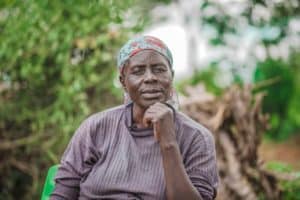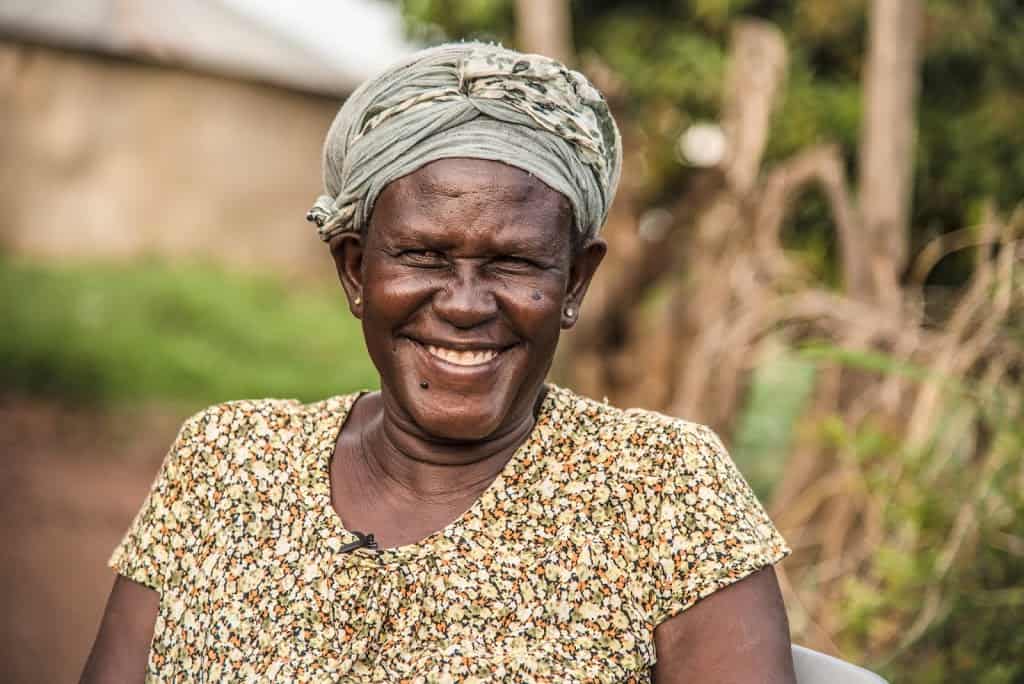Since October 2016, GiveDirectly has been sending monthly cash transfers to 95 adult residents in a remote village in Kenya. This village is the pilot site for our broader universal basic income initiative. “Remote” is often a code word for “poor.” But other vulnerabilities in age, gender and marital status contribute as much, if not more, to poverty. This village is unique because it has a higher proportion of widowed women than average (44% vs. 21%) and an even higher proportion of elderly widows (81% vs. 57%).
My colleague Salome and I sat down for a focus group discussion with 21 elderly women. I share below how they – in their own words – described their experience receiving a basic income.
This village wasn’t always poor. These widows fondly remember a past of abundant food, generous neighbours and an economy where little or no cash was needed to thrive.
“We could till land using our hands and get bumper harvest. We were doing a lot of sorghum. Fish was available, such that 50 cents could afford a whole week’s supply of fish.” -Patricia, 79
“We used to do very little farming but produce so much [that] the grain store could be filled with produce from a very small piece of land. You needed to have people to help harvest.” -Margaret, 85
That story has changed. The same village today is dry, bare and ravaged by poverty. The modern cash economy means old livelihoods are less viable. These widows report needing between $1 and $3 daily to provide their basic needs, yet most have never been formally employed. In our focus group discussions, the widows shared the everyday strains of life before they started receiving cash transfers.

“Before GiveDirectly’s transfers, I was a casual labourer. I was left behind with orphans that I had to work hard for. It was a really difficult job but I had to do it. To me it was like committing suicide, I used to overwork myself being that I had many children to take care of, buy food and other things. I would do this continuously.” -Mary, 61
“I was majorly burning charcoal. I did that, and one day, I cut a huge tree that fell on me, I was only rescued by people who heard me screaming. I have burnt charcoal for long. God did not bless me with a child so I was burning charcoal and doing casual work to earn a living.” -Alice, 75
Having grown up in rural villages, I was reminded when talking to these women, about the toils my own mother endured to ensure we had food. With 14 children in our home, she was under immense pressure to meet all of our needs.
Since the start of their basic income (18 months in, and 11 years to go), some of the women, like Magdalene, say they have been able to give up hard labor:
“I no longer work in people’s farms. I cannot do that job any more. I am sick. I use my transfers to purchase food and pay school fee for my orphaned grandchildren. My life is better because even when I run out of money, I can approach someone to borrow me so that I pay later.” -Magdalene, 76
Others still engage in casual labour, but with more flexibility:
“I go once in a while when I feel like. It is not a must. I now concentrate on my farm. At times when I am through with work at my farm, I rest and take some time to burn charcoal, just a little, not as before.” -Joyce, 60
And though the rigidity of needing to work (or work under tough conditions) has lessened for some, 58% of the widows say they’re actually more likely to work now. Notably, there’s more interest in work among these old women. In 2016, 30% felt they were too old to work; in 2017 only 20% felt the same way. “I now feel like I need to work harder and sustain a good life,” is how 64-year-old Karen put it.
The assurance of 12 years of transfers has boosted the confidence for some women, making them more open to both risks and opportunities:
“Believing that payments will continue for that long has influenced my confidence of making decision of investing in a large scale farming that l could not have managed to do.” -Jane, 79
“I used to think that salaries are only meant for people who live in the urban places. I am glad that today, I am earning a salary. I have hopes that I will be earning my salary for twelve years given life by God.” -Magdalene, 76
It has also helped them feel independent rather than a burden on their children.
“Because we don’t want to be always dependent on our children, calling them all the time. We would love for our children to know that we can also take care of ourselves, our children also have responsibilities; at times they go hungry. At least for us we don’t go hungry.” Jane, 79
Some honestly acknowledge that their goal is not necessarily to learn a lot of new things. One woman pointed to an organization that came to teach women agricultural skills. She described getting very little out of the training and said she does not intend to apply the curriculum.
Still, the majority of these women have clear plans and goals. 71% have reported saving in a pool. When asked how they plan to use the money to improve their lives, 55% said they want to fix their homes, buy and keep domestic animals or start a business. Perhaps contrary to expectations, food and health were mentioned by only 10% of these recipients.
Leonida, age 82, knows that she may not have many years remaining. For her, 12 years of transfers mean that “I can now apply for National Hospital insurance fund card and pay for it on a monthly basis… I am now happy and look forward to have the money and eat well before I die.”
